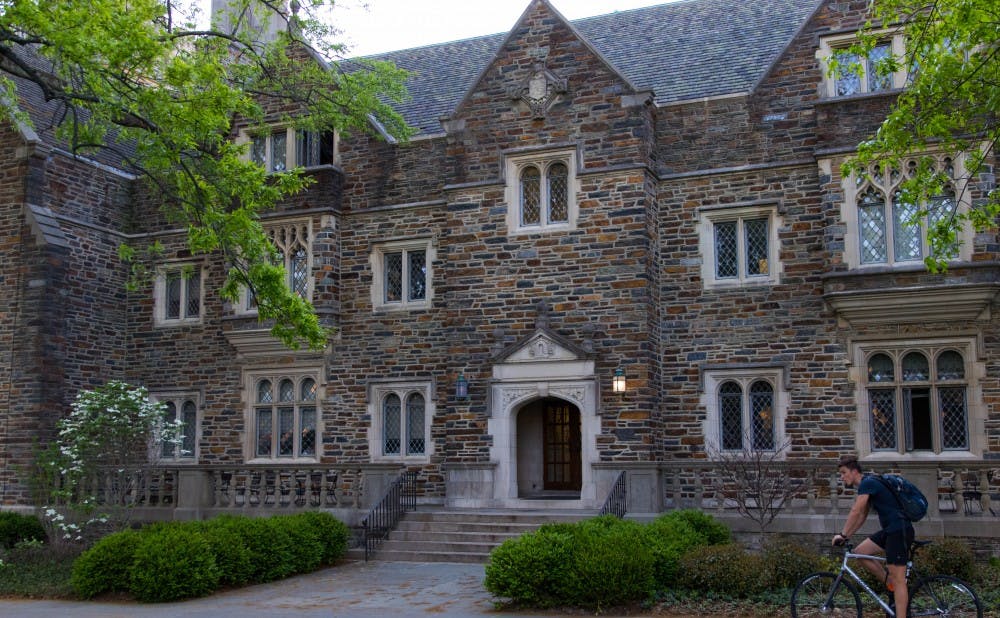The U.S. Department of Justice filed a statement of interest on Thursday in a lawsuit accusing 17 elite universities, including Duke, of illegally colluding to limit financial aid.
Former students alleged that universities engaged in price fixing by relying on a shared method to calculate applicants’ financial needs in the January lawsuit.
The DOJ’s statement, which claims that the universities’ arguments contain legal errors, comes amid a pending motion from the schools to dismiss the case.
The universities are members of the “568 Presidents Group,” who have agreed on the “Consensus Approach,” which is “a set of common standards for determining the family's ability to pay for college.” Duke has been a member of the 568 Cartel since 1998, per the January complaint.
The restraint of interstate trade and commerce is a violation of Section 1 of the Sherman Act, which outlaws "every contract, combination, or conspiracy in restraint of trade," and any "monopolization, attempted monopolization, or conspiracy or combination to monopolize."
The universities would be immune from violating antitrust laws if they had complied with the 568 Exemption, which “allowed the 568 Cartel members to eliminate incentives to compete if all of the members admitted all students on a need-blind basis,” the January complaint reads.
However, at least nine of the schools involved, including Duke, have not qualified for the exemption because they “made admissions decisions taking into account the financial circumstances of applicants and their families, through policies and practices that favored the wealthy.”
In their statement, the DOJ alleged that the defendants’ arguments contain two legal errors, supporting plaintiffs’ claims that the universities violated antitrust laws.
First, the 568 Exemption does not apply to agreements between entities that fulfill the exemption’s prerequisites and those that do not, such as Duke, according to the statement.
“An agreement that includes an institution that is not need-blind does not qualify as an agreement between institutions ‘at which all students admitted are admitted on a need-blind basis,’” the statement read. “It therefore would fall outside the scope of the 568 Exemption.”
Next, the schools’ “‘actual knowledge’ of their co-conspirators’ admissions policies is not relevant to whether the 568 Exemption applies or whether their conduct violates the Sherman Act,” the statement read.
The DOJ noted that plaintiffs “adequately alleged that the agreement violates the Sherman Act.”
Chris Simmons, Duke's interim vice president for public affairs and governmental relations, declined to comment.
“We are very pleased that the Department of Justice has filed this statement supporting Plaintiffs on the key issues in this case,” wrote Robert D. Gilbert, Esq., managing partner of Gilbert Litigators and Counselors, LLC, one of the three law firms representing the plaintiffs, in an email to The Chronicle.
In April, Duke filed a joint motion alongside other universities to dismiss the antitrust case. According to the defendants’ motion, the plaintiffs’ antitrust claim fails because the collaboration they challenge is “exempt from challenge under the antitrust laws.”
Plaintiffs filed a memorandum responding to the joint motion to dismiss the case on June 10. They claimed that if each university allocated an additional 2% of its unrestricted endowment funds annually to financial aid, nine of the 17 universities, including Duke, could provide free tuition to current students on financial aid. The net price at the eight other universities would fall by an average of almost $12,000 annually.
A hearing on the defendants’ motion to dismiss the lawsuit is scheduled for Aug. 2 in Illinois federal court.
In addition to Duke, the suit accused Brown University, the California Institute of Technology, the University of Chicago, Columbia University, Cornell University, Dartmouth College, Emory University, Georgetown University, Johns Hopkins University, the Massachusetts Institute of Technology, Northwestern University, Notre Dame University, the University of Pennsylvania, Rice University, Vanderbilt University and Yale University.
Katie Tan contributed reporting.
Get The Chronicle straight to your inbox
Sign up for our weekly newsletter. Cancel at any time.

Milla Surjadi is a Trinity junior and a diversity, equity and inclusion coordinator of The Chronicle's 119th volume. She was previously editor-in-chief for Volume 118.

